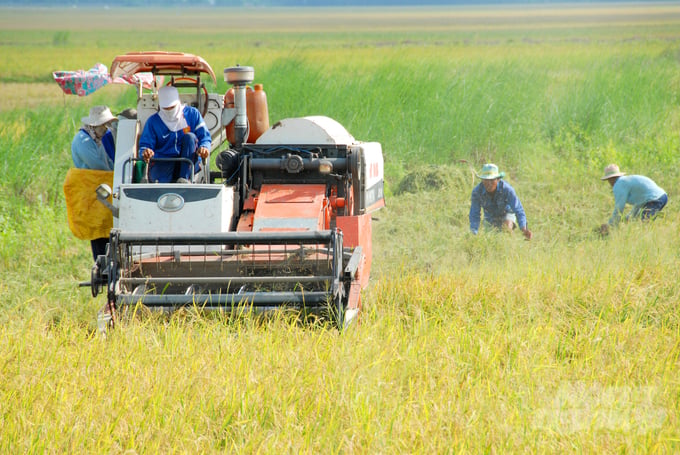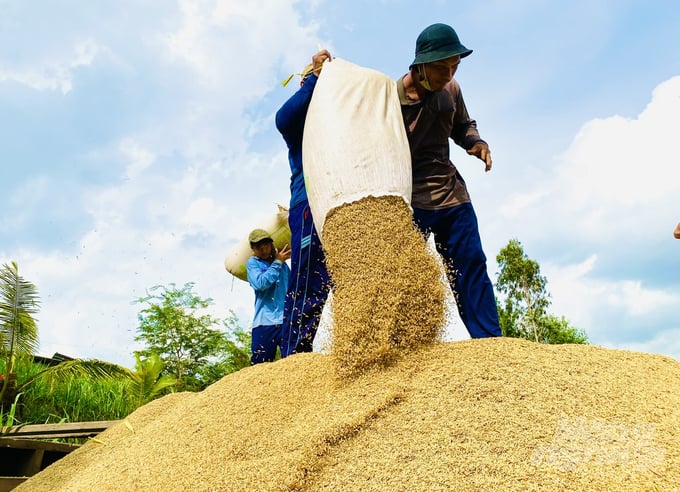June 19, 2025 | 07:20 GMT +7
June 19, 2025 | 07:20 GMT +7
Hotline: 0913.378.918
June 19, 2025 | 07:20 GMT +7
Hotline: 0913.378.918

Tri Ton District is participating in the One Million Hectares of High-Quality Rice Project with nearly 27,000 hectares across 88 production sub-regions. Photo: Le Hoang Vu.
Tri Ton District (An Giang Province) has received official recognition for its agricultural development potential over the years. Notably, the district boasts the largest rice-growing area within the province. In recent years, Tri Ton has made significant progress in implementing the "Sustainable Development Project for one million hectares of specialized, low-emission, high-quality rice in association with green growth in the Mekong Delta region by 2030." Accordingly, the district saw active participation from cooperatives, farmers, and local government authorities. The project aims to boost farmers' incomes as well as mitigate negative environmental impacts, thereby fostering sustainable development throughout the Mekong Delta.
According to Nguyen Van Van, Head of the local Department of Agriculture and Rural Development, Tri Ton District has registered to participate in the new initiative with the aim of utilizing its rice cultivation strengths and building on the foundation of the Vietnam Sustainable Agriculture Transformation (VnSAT) Project. Accordingly, it contributed nearly 27,000 hectares across 88 production subregions. Over several years of implementation, the project has yielded positive results owing to the close coordination between local government agencies, cooperatives, and farmers. During the implementation process, the district’s agricultural sector has focused on zoning areas for high-quality rice production and training farmers to adopt environmentally friendly farming practices.

The project aims to boost farmers' incomes as well as mitigate negative environmental impacts, thereby fostering sustainable development throughout the Mekong Delta. Photo: Le Hoang Vu.
After receiving training from Tri Ton District’s Department of Agriculture and Rural Development, local farmers have mastered advanced rice cultivation techniques, including using organic fertilizers, adopting water-saving irrigation methods, and reducing the use of pesticides. These practices help lower production costs and protect the environment by reducing greenhouse gas emissions. In addition, local governments are supporting farmers in accessing markets to ensure favorable prices for their high-quality rice products.
Cooperatives and farmers are the direct participants and beneficiaries of the One Million Hectares of High-Quality Rice Project. Dang Thai Hien, Director of Loc Phat 1 Agricultural Cooperative in Nui Voi Commune, Tri Ton District, noted that, with support from local government agencies and agricultural experts, cooperative members have gradually transitioned to sustainable farming practices. “We have been able to reduce costs in rice production as well as increase yields and improve rice quality. Low-emission rice production has provided our cooperative with a more stable output, thereby drawing greater interest from partners,” Director Hien added.
Both cooperatives and farmers have expressed satisfaction following their participation in the project. Tran Van Thanh, an experienced rice farmer in Tri Ton District, shared, “Traditional rice cultivation previously brought challenges in terms of production costs and market access. After joining the project, I have been able to save on expenses and enjoy more reliable sales channels. Using organic fertilizers and minimizing pesticides have also enriched my soil, enabling healthier rice growth with fewer pests and diseases.”

Tri Ton District has achieved positive results after implementing the project, owing to the close coordination between local government agencies, cooperatives, farmers and businesses. Photo: Le Hoang Vu.
The project has also raised farmers' awareness regarding the importance of environmental protection in rice cultivation. Tran Van Thanh emphasized that reducing the use of chemicals helps protect farmers’ health as well as the local water sources and soil quality.
According to Nguyen Si Lam, Director of An Giang Province’s Department of Agriculture and Rural Development, Tri Ton District is a model example for the project’s implementation and a source of inspiration for other regions in the province. Moreover, the district has demonstrated creativity and efficiency in executing the One Million Hectares of High-Quality, Low-Emission Rice Project, proving that sustainable agriculture is suitable development direction for the Mekong Delta.
An Giang’s agricultural sector is committed to supporting Tri Ton and other regions in the province by improving support policies and facilitating the expansion of the project. Notably, the province will focus on promoting both economic and environmental sustainability. With the united efforts of the local governments, cooperatives, and farmers, this initiative aims to bring a transformative new outlook to An Giang’s rice industry.
Translated by Nguyen Hai Long
/2025/06/17/3942-2-143243_548.jpg)
(VAN) Recently, in Sweden, the Secretary of the Binh Dinh Provincial Party Committee presented the Investment Registration Certificate for the 'Polyester Fabric Recycling Complex' project to SYRE Impact-AB Company.
/2025/06/12/3721-2-202745_83.jpg)
(VAN) TH made an impression at Seoul Food 2025 with its line of natural beverages, paving the way for Vietnamese food products to enter the South Korean market.

(VAN) Soc Trang's success in rice exports stems from a strategy of developing fragrant and specialty rice cultivation areas and standardizing production toward low-emission practices.
/2025/06/11/1311-5-120811_839.jpg)
(VAN) The pig farming industry is facing the challenge of comprehensive restructuring to meet requirements for quality, safety, traceability, and market expansion both domestically and for export.

(VAN) Vietnam considers participating in ALGROALBA in order to expand agricultural production, coordinate the assessment and effective exploitation potential land.
/2025/06/05/5314-1-184727_407.jpg)
(VAN) From seemingly worthless fish scales and skin, enzymes and lactic ferments can transform by-products into peptides, opening a sustainable, effective business direction and elevating Vietnamese seafood.

(VAN) TTC AgriS and IFC signed a strategic partnership to develop a sustainable agricultural value chain, aiming to achieve the Net Zero target by 2035.